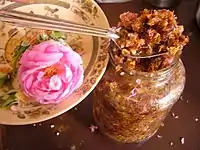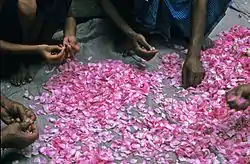Gulkand
Gulkand (also written gulqand or gulkhand) is a sweet preserve of rose petals believed to come from Indo-Persia. The name is a Persian and Arabic word which breaks down to gul (rose) and kand (sugar or sweet).[1][2]
 | |
| Alternative names | Rose petal jam |
|---|---|
| Region or state | Indian Subcontinent |
| Serving temperature | Room temperature |
| Main ingredients | Rose petals, sugar |
Preparation
Traditionally, gulkand has been prepared with Damask roses.[3][4] Other common types of roses used include China rose, French rose, and Cabbage rose.[4] It is prepared using special pink rose petals and is mixed with sugar.

Uses in holistic medicine
Gulkand is used in the Unani system of medicine as a cooling tonic. Some of its benefits under the Unani system include fighting fatigue and lethargy, enhancing memory, and purifying the blood.[5] The National Institute of Ayurvedic Medicine also provides a list of benefits from consuming gulkand. These include fighting hyperacidity and dysmenorrhea.[6]
References
- Nadaf, Nilofar; Patil, Renuka; Zanzurne, Chaitanya (2012). "Effect of addition of gulkand and rose petal powder on chemical composition and organoleptic properties of Shrikhand". Recent Research in Science and Technology. 4: 52–55.
- "Gulkand, the Sweet Rose Preserve That's Also an Incredible Summer Coolant". NDTV Food. Retrieved 30 October 2020.
- Jat, Rajkumar; Mahawer; Bairwa; Meena; Pilania; Singh (2018). "Sensory evaluation and microbial analysis of rose petal jam" (PDF). Journal of Pharmacognosy and Phytochemistry. 7: 617–620.
- Ravsaheb, Mhetre Suhas (2019). "Preparation of gulkand flavored milk". Vasantrao Naik Marathwada Krishi Vidyapeeth.
- Parveen, Rabea; Zahiruddin, Sultan (2020). "Chromatographic Profiling of Rose Petals in Unani Formulations (Gulkand, Arq-e-Gulab, and Rose Sharbat) Using HPTLC and GC–MS". Journal of AOAC International. 103 (3): 684–691. doi:10.5740/jaoacint.19-0289. PMID 31561756.
- Sindhura (28 April 2013). "PRELIMINARY PHYTOCHEMICAL SCREENING AND IN-VITRO ANTIOXIDANT ACTIVITY OF GULKAND". International Research Journal of Pharmaceutical and Applied Sciences. 3: 186–189 – via Research Gate.